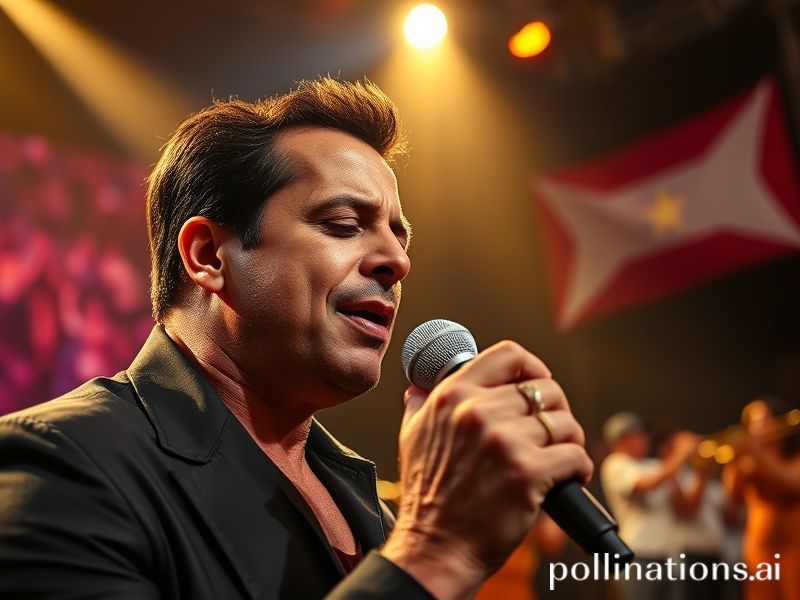marc anthony
Marc Anthony, the salsa colossus who once crooned “Vivir Mi Vida” to stadiums full of people who’d paid triple-digit ticket prices for the privilege of crying in public, has become an unlikely barometer for the planet’s emotional weather. From Dubai’s brand-new climate-controlled beach clubs to the favela sound systems of Rio, that brassy trumpet intro still detonates like a diplomatic incident: suddenly everyone is a temporary Puerto Rican, waving flags they bought on Alibaba and mourning ex-lovers they never actually dated.
The global numbers are, in the understated language of the streaming era, obscene. Spotify lists him in 187 countries—even North Korea shows three monthly listeners, presumably bored apparatchiks plotting defection to Miami. His latest single, “Pa’llá Voy,” racked up 200 million views in 48 hours, a feat that required the electrical output of a small Balkan nation and the existential despair of every indie musician still rehearsing in a garage in Tallinn. Analysts at Goldman Sachs—because even heartbreak is securitized now—note that Marc Anthony’s catalogue alone props up roughly 0.0004% of U.S. GDP, a slice slightly larger than the entire oat-milk sector.
But the international significance runs deeper than mere metrics. In Madrid, austerity-scarred millennials cling to “Ahora Quien” like a sonic eurobond, refinancing their twenties with each melancholic chorus. Meanwhile, Lagos TikTok influencers have adopted “Flor Pálida” as the soundtrack to crypto-scam confessionals, proving that heartbreak is the most fungible of currencies. Even the Swiss—neutral, chocolate-lubricated, and surgically allergic to disorder—schedule their euthanasia clinics to “Te Conozco Bien,” presumably because nothing says dignified exit like a minor key.
Diplomatically, Anthony functions as a soft-power weapon Washington never asked for but desperately needs. When U.S.–Argentina relations soured over IMF debt, a single Instagram duet with L-Gante thawed more ice than a year of State Department cocktail parties. The Chinese ambassador to Peru was recently filmed awkwardly swaying to “Valió la Pena” at a state banquet, a moment that went viral on Weibo under the hashtag #SalsaOrDebt, reminding citizens that economic colonialism goes down easier with horns.
Of course, the cynic—present company included—might observe that globalized sentiment is just another commodity. Every tear shed in a Warsaw Uber to “Y Hubo Alguien” is harvested by data brokers and repackaged as “Latin Lover” scented candles sold in suburban Berlin malls. Spotify’s algorithmic curators have quietly filed a patent for “Reggaeton-Induced Breakup Prediction,” allowing advertisers to target consumers the very second serotonin flatlines. Somewhere in Silicon Valley, a product manager is A/B testing which key change triggers the most impulse purchases of discounted airline tickets to San Juan.
Yet even the most jaded observer must concede that Anthony’s voice—equal parts cathedral and dive bar—still slices through the static of late-stage capitalism like a machete through cheap rum. When he hits the final high note of “Vivir Mi Vida,” the collective inhalation across continents is audible on Doppler radar. For four minutes and twenty-three seconds, debt ceilings, drone strikes, and the inexorable heat death of the planet recede. Then the song ends, the lights come up, and the audience shuffles back to economies teetering like a drunk tourist on a Segway. Still, the echo lingers, proof that humans remain incorrigibly hopeful—or at least too stubborn to delete the playlist.
And so Marc Anthony tours on, a 54-year-old father of six who looks 39 and sings like 29, hauling his grief-cum-curriculum around the globe. Someday archaeologists will sift through our ruins, find a USB stick labeled “Greatest Hits,” and wonder why a species capable of lunar colonies chose instead to dance in circles, clutching strangers, shouting lyrics in languages we never formally learned. The answer, of course, is that we were trying, against all evidence, to stay alive.







